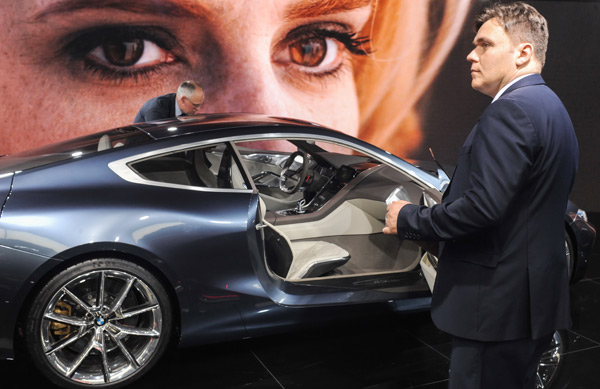Carmakers welcome reform

Foreign companies positive on pledge to lift JV equity cap
China's move to open up its automotive industry is winning applause from international carmakers at the ongoing Auto China, the biggest car show in the world's largest car market.
Last week, China announced plans to scrap the decades-old 50 percent cap on foreign equity in automotive ventures by 2022.
"Of course we welcome this move, which we think is a very positive development," said Dieter Zetsche, chairman of Mercedes-Benz's parent company Daimler AG.
"(It) will lead to new economic considerations and market insights about what is the best way to move forward."
China is the world's largest market for Daimler, where it sold more than 600,000 cars in 2017. It has been localizing its Mercedes-Benz cars with BAIC Group and producing electric cars under a brand called Denza with BYD Co.
Volkswagen AG CEO Herbert Diess said: "It is a very important move for the Chinese government to open up, to liberalize the market, because it should always be beneficial for additional investment and growth."
Volkswagen, the world's largest carmaker by sales volume, has announced plans to invest 15 billion euros ($18.3 billion) by 2022 with its Chinese joint ventures in new energy vehicles, autonomous driving, digitalization and new mobility services.
The German car group delivered more than 4 million cars in China last year, some 40 percent of its global sales and about 17 percent of the country's total passenger car sales in 2017.
China is also working on what will be a "substantial" tariff reduction for imported cars, Chen Yin, chief engineer of the Ministry of Industry and Information Technology, said on Wednesday.
Andy Palmer, CEO of British sports carmaker Aston Martin, called it a "remarkable" step.
"I welcome the move, and it will make our cars more affordable. Tariffs are normally there to protect the industry, but the Chinese industry does not need protecting any more. It is strong."
Marco Schubert, president of FAW-Volkswagen's Audi sales division, told Reuters that international carmakers will likely ship in more cars when China starts to reduce import duties on vehicles.
About 10 percent of Audi vehicles sold in China are imported, and that share will likely rise for Audi and its rivals, he said.
China has lowered auto tariffs several times since 1986, with the tax rate down from 220 percent to the current 25 percent.

